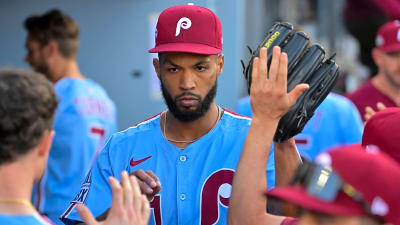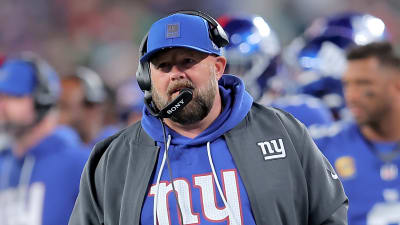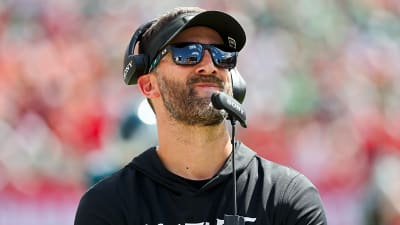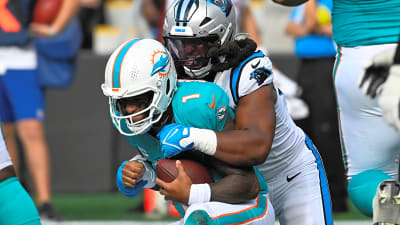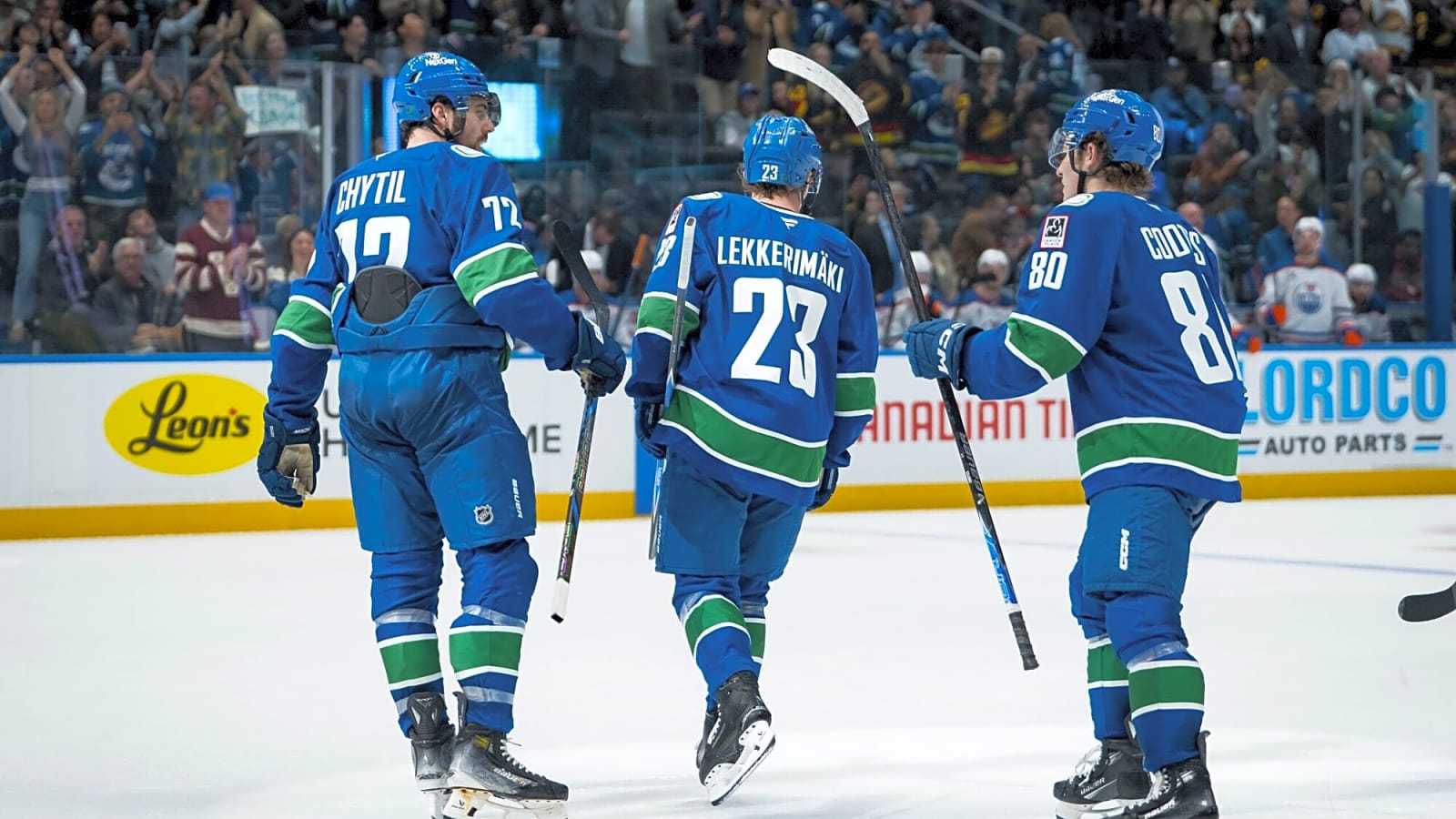
Few have described what is currently happening with the Vancouver Canucks as an outright ‘youth movement.’ And yet…
Opening day rosters for each NHL team were announced on Monday, October 6, 2025, and the Canucks had already made their list of players known on the preceding weekend. With Victor Mancini and Tom Willander being made the last two cuts, the Canucks were down to an active roster of 23 players and one more on Injured Reserve (Nils Höglander).
Every year, when the opening day rosters come out, certain websites like to compile the biographical information. The fine folks over at EliteProspects do a great job of it. And upon checking that new array of roster-related info out, we were mildly shocked to learn that the Canucks are heading into the 2025-26 season as the fifth-youngest team in the entire NHL.
It’s a fact that, admittedly, snuck up on us a bit. But maybe it shouldn’t have. The Canucks have had an awful lot of young players join the team over the past year or so. Still, this almost falls into the category of ‘too good to be true.’
The Canucks’ opening day roster for the previous 2024-25 campaign had an average age of 28.0 years, right on the nose. That made them the 11th youngest team in the NHL at the time. As of opening day 2025-26, the Canucks now have an average age of 27.0, also on the nose. That may not feel like an enormous difference, but that single year is enough to plunge the Canucks six spots in the ‘seniority standings,’ and we’ve got some thoughts on that.
First: how did we get here?
Plenty of veterans have departed that 2024-25 roster, including JT Miller, Pius Suter, Carson Soucy, Noah Juulsen, Danton Heinen, and Vincent Desharnais. A few veterans have arrived to replace them in the meantime, including Marcus Pettersson, Filip Chytil, Drew O’Connor, and Evander Kane.
But more and more of the replacements have been coming from within the system. Names like Jonathan Lekkerimäki, Elias Pettersson the Younger, Linus Karlsson, Aatu Räty, and Arshdeep Bains have all arrived from Abbotsford to claim roles, and that can’t help but to drag the average age down.
Now, we all know there is one primary culprit here, and it’s Braeden Cootes. A major age-related outlier, the 18-year-old Cootes has singlehandedly dropped the Canucks a few slots on the age rankings. Remove him from the equation, and the Canucks aren’t quite back to where they were last year, but they are about halfway with an average age of about 27.5.
But removing Cootes from the equation isn’t really a legitimate piece of math at the moment. For one, he made the team, fair and square, and should be in Vancouver for at least nine games. Even if the current plan is to send him back to Seattle of the WHL thereafter, that could change.
For another, even if Cootes doesn’t end up being a permanent addition to the 2025-26 roster, he’ll be back eventually. He’s now a big part of the Canucks’ future, and if we’re taking this ‘age ranking’ as any indicator about the brightness of said future, it makes ample sense to include him.
What we feel a bit compelled to say here is that there is a bit of a ‘youth movement’ happening in Vancouver, and that it’s perhaps become a bit underrated. Much of the attention has been paid to GM Patrik Allvin and Co.’s work with the NHL roster, and maybe not enough to what they’ve done to the depth chart below the roster. Smart signings and better drafting that this franchise is used to have led to a more well-stocked prospect cupboard that is already yielding some pleasant surprises.
And if the Canucks find a way to be competitive, or at least return to the postseason, in the midst of this youthening, then they’ll also be somewhat unique. As we look at the age rankings for 2025-26, we notice that just one team in the bottom-13 – that being the Montreal Canadiens, the outright youngest team in the NHL – made the playoffs in 2024-25. There are plenty of others there, including the Canucks, that will try to change that this year, but most will fail at that goal. The Canucks, meanwhile, would seem to have both got younger and got a little closer to their playoff goal this offseason.
That dual movement strikes us as something hard to pull off, but it’s a noble goal toward a more long-term success.
There are, of course, some downsides to youth, and at least one of them is fairly obvious. The Canucks will enter the 2025-26 season as the fifth-youngest team in the league, but also as the absolute lightest with an average of 194 pounds.
This stands in pretty stark contrast to the league-leading Boston Bruins and their 208 pounds on average. And again, we have to point to Cootes and his growing frame as a major culprit here.
Size isn’t everything, and we must point out that some of the Canucks’ slightest players, like Marcus Pettersson at 174 pounds, are also some of their hardest-hitting. In any case, however, the lack of weight will be a shortcoming the Canucks need to battle through in 2025-26.
We wrote earlier in the summer about the notion that Vancouver had entered a competitive ‘no man’s land,’ and we pushed back against that notion. We think this new data supports that pushback even further. It’s tough to say that a team is in any sort of no man’s land when so many of their players still have their best years ahead of them.
The amount of Canucks who are either in their prime or yet to enter it is considerable, and includes their best players like Quinn Hughes (24) and Elias Pettersson (25). Yes, the uncertainty regarding Hughes’ contract is an unavoidable crossroads that will have massive implications to the team’s ability to compete in the mid-term future.
But here’s the thing with this whole ‘fifth-youngest team’ deal: it’s an outright positive regardless of what happens with the rest of the roster.
Whether Hughes stays or goes is largely outside of the control of the Canucks, and certainly outside the control of the fanbase. But a team having this many good young players on hand has a future, no matter what. If Hughes stays, then his best years will be buoyed by a growing cast of supporting talent. If he leaves, then at least the Canucks have already got a good start on building the next phase of their core.
What entering the 2025-26 season as the fifth-youngest team in the NHL really means is that any success the Canucks achieve this season can almost certainly be built upon in future years. That Hughes deadline may make everything feel very ‘now or never’ when it comes to this season, but nothing is ever really ‘now or never’ in professional sports.
There is always another season to come. And the Canucks now have plenty of players on hand who will be here, and be in their prime, for the next several into the foreseeable future.
LATE UPDATE: With Victor Mancini on the roster, the Canucks’ average age comes down to 26.84 (which is still fifth-youngest in the league).
More must-reads:
- The 20 NHL players under the most pressure for the 2025-26 season
- Maple Leafs making the right call with major roster decision
- The 'Team USA men's basketball coaches' quiz
Breaking News
Trending News
Customize Your Newsletter
 +
+
Get the latest news and rumors, customized to your favorite sports and teams. Emailed daily. Always free!

